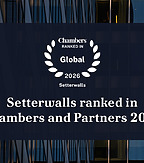Article | 25 October 2021
SCC Express – a new tool to fill the gap in the dispute resolution market

The Arbitration Institute of the Stockholm Chamber of Commerce (the SCC) has recently expanded its range of dispute resolution tools by launching the SCC Express Dispute Assessment (SCC Express). By using SCC Express, disputing parties can obtain an objective legal assessment of a contested issue in only three weeks and at a fixed price. The purpose of SCC Express is to fill a gap in the market not covered by other types of dispute resolution tools. Albin Larsson and Erik Gyllang at Setterwalls guide you through the rules for SCC Express and explain in which situations this new tool could, and should, be used.
What is SCC Express?
The SCC has recently introduced a new tool for dispute resolution – SCC Express. The SCC has justified the launch with an increased demand for alternative forms of dispute resolution in general and a demand for tools that can fill the gap not covered by other forms of dispute resolution (for example arbitration and mediation) in particular.
SCC Express is a consent-based and confidential procedure, the purpose of which is to enable disputing parties to obtain an objective legal assessment of one or more disputed issues very quickly and at a fixed price of EUR 29,000.
Within the framework of the procedure, the SCC Board appoints a neutral Legal Expert who has discretion to determine how the procedure should be administered. The procedure results in an assessment of the disputed issues, presented in writing by the Expert no later than 21 days after the dispute was referred to him or her.
In principle, the Expert’s assessment is not enforceable or binding upon the parties. Instead, it is primarily intended to provide the parties with valuable guidance for the subsequent handling of the issues in dispute, for example in settlement negotiations. Accordingly, the primary purpose of SCC Express is to give the parties an opportunity to move forward in their contractual relationship without having to undergo full-scale proceedings in arbitration or court.
However, the parties may make an agreement that the Expert’s assessment shall be contractually binding. The parties may also jointly appoint the Expert as an arbitrator and request that the Expert’s assessment be confirmed as an arbitration award, which will then be enforceable in the same way as other arbitration awards.
How does the procedure work?
- One of the disputing parties initiates the procedure by paying the application fee of EUR 4,000 and submitting a request to the SCC for the appointment of an Expert. The request shall include information on the disputing parties, a description of the dispute and an account of the issue or issues to be assessed.
- The SCC communicates the request to the counterparty and gives the counterparty an opportunity to respond. If the counterparty’s consent has not already been included in the initial request, the counterparty is also asked to verify that it consents to the procedure.
- The parties pay the rest of the fee for the procedure – EUR 25 000. Unless otherwise agreed, each party shall pay an equal share of the total fee for the proceedings.
- Within 48 hours of paid fee, the SCC appoints an Expert. The SCC takes into account any suggestions from the parties regarding the Expert to be appointed. The SCC then refers the matter to the Expert.
- The Expert determines the administration of the procedure, which means that it can and should be adapted to the circumstances of the individual case. However, the parties shall always be given reasonable opportunity to present their respective positions, taking into account the limited time for the procedure. No later than 21 days from the receipt of the case, the Expert shall present its assessment in writing, together with summarizing conclusions regarding the issues in dispute.
- The Expert’s assessment is, in principle, not binding or enforceable. The parties may, however, agree to give the assessment contractually binding effect or jointly appoint the Expert as an arbitrator and request that the assessment be confirmed in an arbitration award (which will then also be enforceable).
Setterwalls’ comment
The most common forms of dispute resolution, such as arbitration and court proceedings, will continue to be the primary tools for resolving disputes. The main advantage of such proceedings is that they lead to enforceable judgments/awards, meaning that they can be used to force a non-compliant counterparty to fulfil its obligations. In addition, there are several alternative forms of dispute resolution, such as mediation, which will continue to fulfil the same needs as before.
Unlike dispute resolution in arbitration and court – but similarly to mediation – SCC Express does not result in an enforceable decision for the parties. However, like arbitration and litigation – but unlike mediation – SCC Express results in an objective legal assessment of the issues in dispute. The idea is also that the assessment, without being binding, may help the parties to move forward in their contractual relationship. The latter purpose is also the same as for mediation. SCC Express is thus in some respects in the borderland between arbitration and mediation, but it also has characteristics that are unique to SCC Express. Therefore, this new tool provides a function that other forms of dispute resolutions lack.
Used correctly, in appropriate situations, and under the guidance of competent Experts, we believe that there are good chances for SCC Express procedures to provide quick and comparatively cheap solutions to certain disputes that would otherwise have led to protracted and costly proceedings. Such disputes include situations in which both parties are convinced that they are right in one or more issues strictly concerning legal interpretation.
Against this background, we have a positive view on the introduction of SCC Express and share the SCC’s view that the procedure may fill a gap in the dispute resolution market.
However, one must also keep in mind the limitations of SCC Express. The very tight deadlines and the fact that only one person assesses the disputes makes the procedure suitable primarily for well-defined disputes that do not require extensive examination of evidence. We believe that SCC Express will be most useful in disputes concerning issues of contractual or legal interpretation or in the assessment of evidentiary issues that do not require comprehensive investigations by either party. We expect that the possibility to make the Expert’s assessment binding will be used only in exceptional cases.
In summary, it is our conclusion that SCC Express will probably be used in a relatively small number of cases each year. However, it may still fulfil a function in the market that other dispute resolution tools do not. Accordingly, lawyers active within the field of dispute resolution (whether as internal or external counsel) would do well to familiarize themselves with this tool.
Setterwalls is looking forward to following the use of SCC Express and is happy to assist with advice on when the procedure should be used.
More information about SCC Express can be found here and the rules for SCC Express can be found here.
Contact:
Practice areas:


